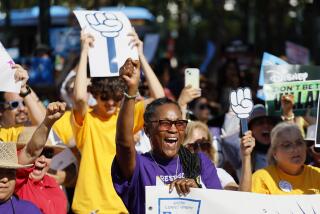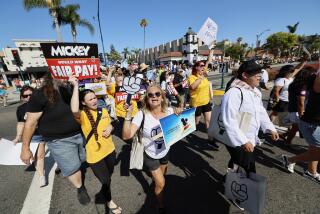Chicago students return to school as teachers, city claim victory
Chicago schoolteachers and students went back to their classrooms Wednesday morning after seven work days on strike in the nation’s third-largest school district, with the city and the union each finding reasons to claim at least some degree of victory in the often-acrimonious dispute.
The proposed contract now goes to the more than 26,000 members of the Chicago Teachers Union, who are expected to ratify the agreement offering annual raises of 3%, 2% and 2% over three years and a possible fourth year at 3%. With cost-of-living increases and extra pay for more experience and advanced degrees, most teachers can expect at least double-digit raises over the life of the pact. The average teacher salary in Chicago is about $76,000, though starting pay is significantly less.
Still, the strike, which closed classes for about 350,000 students, more often seemed about issues other than pay. The dispute centered especially on layoff policies and the role of students’ standardized test scores in evaluations. It was those issues that helped propel the Chicago strike into the spotlight in the nation’s ongoing battle over the quality of education, particularly in financially pressed large cities.
The union fell short of the 30% raises it had sought, but President Karen Lewis said that her side had nevertheless gained ground, such as by blocking Mayor Rahm Emanuel’s call for merit pay and a tougher evaluation plan. The union also won a policy to recall high-performing teachers who were laid off because of school closings.
“We feel very positive about moving forward,” Lewis told reporters. “We feel grateful that we have a united union, and that when a union moves together, amazing things happen.”
At a news conference at Chopin Elementary School, Emanuel also claimed victory as he greeted returning students.
“I’m excited our kids are back,” said the mayor, who has been a frequent target of the union. “My first goal was to right the ship academically.”
The new contract will add $74 million a year to the city’s costs, compared to $129 million in the previous contract, giving Emanuel grounds to boast of fiscal responsibility, an increasing vocal mantra that crosses partisan political lines. Part of the national interest in the strike came from its pitting of a Democrat against a public employee union in a presidential election year and from Emanuel’s former role as chief of staff to President Obama.
“Our taxpayers are paying less, and our kids are getting more,” Emanuel said.
Emanuel also succeeded in his goals of lengthening the school day and of getting an evaluation system that has at least some recognition of student performance as required by state law.
“This settlement is an honest compromise,” Emanuel said. “It means a new day and new direction for the Chicago Public Schools.”
The end of the strike cheered parents, many of whom had to struggle to find alternative care for their children. The district kept 140 schools open for meals and other activities for part of each strike day.
For Erica Weiss, an end to the strike meant she wouldn’t have to take her 6-year-old daughter to work.
“I am elated. I couldn’t be happier,” Weiss told the Associated Press. She said she had to leave work in the middle of the day to pick up her daughter from one of the schools that stayed open and then bring her back to her finance job downtown.
“I have no one else to watch her. … I can’t even imagine the people who could have possibly even lost their jobs over having to stay home with their kids because they have no alternate care,” she said. “It just put everyone in a pickle.”
ALSO:
Dog left to die on Colorado mountain; owner defends actions
Texas border patrol on alert after mass Mexican prison breakout
Arizona immigration: ‘Show me your papers’ enforcement to begin
More to Read
Sign up for Essential California
The most important California stories and recommendations in your inbox every morning.
You may occasionally receive promotional content from the Los Angeles Times.










